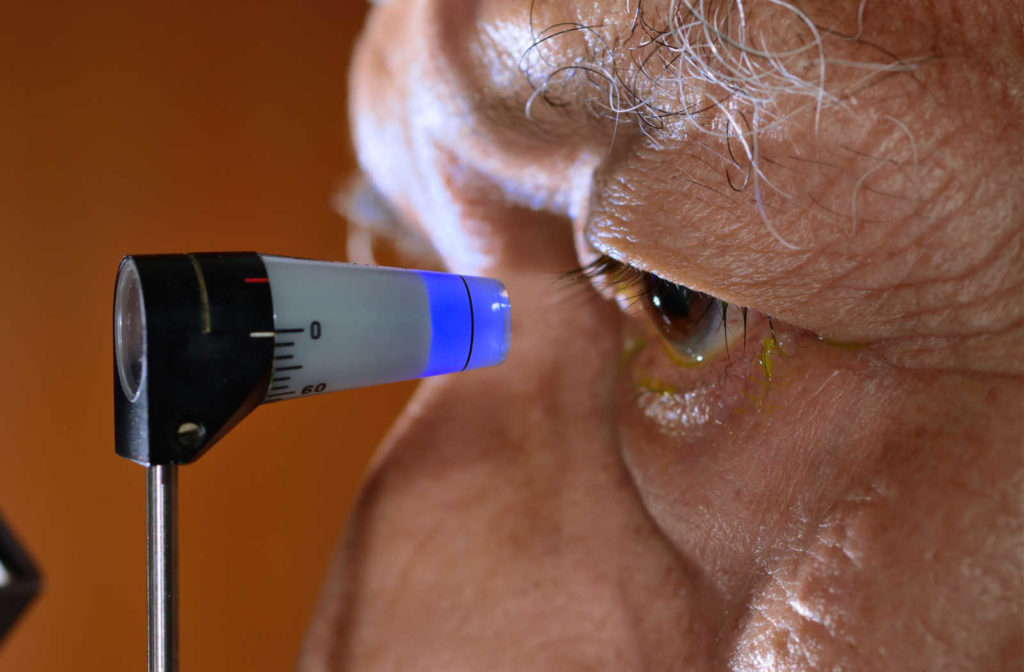They say that eyes are the windows to the soul and are reflective of so much. But there are other things about your health that your eyes show about your health. Your optometrist, with regularly scheduled eye exams, can detect and diagnose if you have glaucoma.
Our eyes are used so much everyday and need to be taken care of. Having a regular eye exam is an important preventative health measure which can detect issues with your vision early before permanent damage is caused. Your optometrist will be able to help detect early signs of glaucoma and protect your vision.
What is Glaucoma?
Glaucoma is a disease that can damage your optic nerve and impact your vision. Your optic nerve supplies the visual information that your eyes take in and transmits it to your brain. In many cases, glaucoma is caused by higher than normal pressure inside your eye. Over time, this pressure will build and can erode the optic nerve tissue which can lead to vision damage or even blindness, in severe cases. In some cases, your eye pressure will not change but there may still be damage to your optic nerve.
The second leading cause of blindness worldwide is due to severe cases of glaucoma. For many people, this disease can go unnoticed. You may notice small changes in your vision which, if they go unaddressed, can potentially lead to blindness.
Are There Different Kinds of Glaucoma?
The most common form of glaucoma is open-angle, but there are also several other kinds of glaucoma. With each type of glaucoma, you may experience and have slightly different symptoms and signs you need to watch out for, but many people will not even notice changes to their vision until it is too late.
Other types of glaucoma are:
- Angle-closure (acute) glaucoma- this is an emergency situation and can come on suddenly. If you experience severe pain, blurred vision and nausea, you must seek emergency medical treatment.
- Congenital glaucoma- often happens in children who have a defect in their eye.
- Secondary glaucoma- this is often a side effect of an eye injury or part of another condition.
- Normal tension glaucoma- increased pressure to your optic nerve.
While many people may not notice that there are changes to their vision, there are subtle changes that can be linked to glaucoma to be aware of. Some of these changes are:
- Sudden blurred vision
- Severe eye pain
- Redness in your eye or eyes
- Sudden disturbances in your vision
- Seeing coloured rings around lights
- Vomiting
- Nausea
If you experience a sudden onset of symptoms listed above, you should see an eye doctor as soon as possible.
How is Glaucoma Diagnosed?
Glaucoma often develops with little to no signs or symptoms, which develop slowly. In some cases, there is a quick onset of symptoms but when this happens, it is already too late. This is the reason that many people often do not know that they even have this disease.
The only way to detect glaucoma is to undergo a comprehensive eye exam. During this eye exam, your optometrist will perform a simple and painless procedure called a “tonometry” during your exam. This will:
- Measure the internal pressure of your eye
- Observe the health of your optic nerve and retina
- Inspect the drainage angle
- Measure your field of vision
Is Glaucoma Preventable?
Unfortunately, glaucoma is not a preventable disease. This disease can come on suddenly due to the deterioration of the optic nerve, pressure of the eye and could lead to blind spots. It’s important to take note of any warning signs to help prevent permanent vision loss and let your optometrist know of any small changes to your vision.
While this disease is not preventable, it is a progressive disease, which doctors are calling the “silent thief of sight”. People with glaucoma can lose up to 40 percent of their sight without having noticeable symptoms. It is the leading cause of irreversible blindness worldwide. With regular comprehensive eye exams, your optometrist can help to identify if you are at a higher risk for glaucoma and begin treatment at the first sign of change to your eye health.
How Can I Treat Glaucoma?
Glaucoma is often treated with eye drops or a combination of eye drops and laser surgery. This is often effective in maintaining your vision, but if you have already lost some of your vision, these forms of treatment will not restore your vision.
Next Steps for Your Eye Health
Having regular eye exams will help your optometrist detect any early signs or changes in your eye health. Even if there are small and subtle changes to your vision that you think might not be worth mentioning, it is better to note this to your doctor than not. The optometrists at Calgary Optometry Centre are here to help you understand all the aspects of your vision and eye health needs. Book an appointment today to have any questions or concerns you may have answered by one of our professionals.




